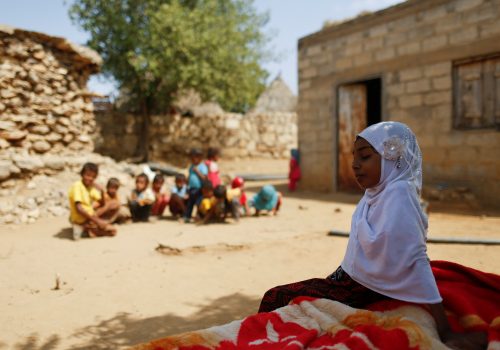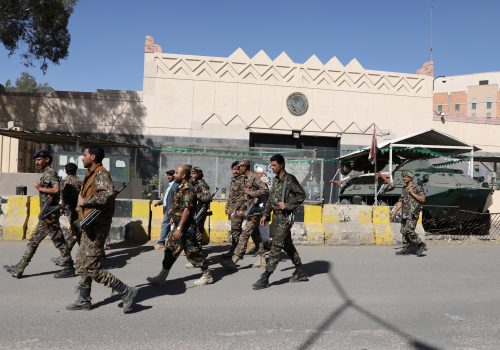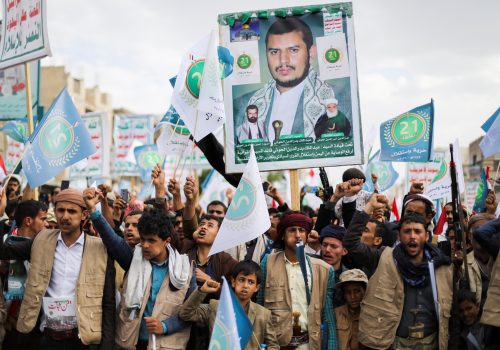Truce or no truce: Transitional justice is Yemen’s only path to healing
Failure to renew the April United Nations (UN) brokered truce in Yemen has let millions of Yemenis down, especially those hoping that real progress would be made this time in implementing the truce’s conditions, which involves the siege on Taiz—the country’s third largest populated city, which has been under siege by Houthis since 2015—and payment of civil servant’s salaries. A statement by the United Nations Special Envoy for Yemen, Hans Grundberg, confirmed that negotiations continue despite this setback.
Nevertheless, such consultations still fall short when it comes to the principles of transitional justice. In fact, none of the peace processes in Yemen are truly based on a human rights and transitional justice approach. Mediators who have spoken to me fear that addressing transitional justice issues complicates the process and impedes progress in the negotiations. For them, the priority is to secure a ceasefire and the appeasement of the parties who sit at the negotiating table. This disregard for human rights puts the interests of the parties to the conflict above the thousands, if not millions, of victims who were impacted by the conflict in Yemen.
Include women in transitional justice
As the war completes its eighth year since September 2014, there is a real need to integrate various components of transitional justice into the peace process. This includes truth-telling committees, accountability, reparations, preservation of national memory, institutional reform, and national reconciliation.
This should be done in a gender-responsive manner, specifically taking into account the needs of women and girls—not only as victims, but also as active stakeholders in transitional justice mechanisms, including active participation in all the national reconciliation bodies.
Yemeni women have already proven their capabilities in this regard and beyond. When they were excluded from actively participating in the Track I peace process of the official political delegations, including the ongoing mediation activities of the UN Envoy’s office, civil society activists and women leaders efficiently took the lead in Track II processes. Yemeni women designed an inclusive vision for peace in Yemen, based on consultations with hundreds of community leaders and tens of women influencers. This vision was manifested in the Feminist Peace Roadmap supported by the Peace Track Initiative Foundation.
What distinguishes this peace roadmap is that it puts the community, especially the victims of the conflict, at the heart of the process and provides recommendations based on human rights and transitional justice principles. For example, this roadmap discusses child soldiers, abductees and detainees, human rights violations, and a mechanism for self-accountability by holding violators and obstructionists of the ceasefire terms accountable. It recommends making transitional justice a priority in the negotiation and transitional phases, and advocates for drafting an inclusive and gender-responsive transitional justice law.
Similarly, the National Reconciliation Movement, a collective of Yemeni experts from all walks of life, also produced a roadmap to peace—one that expresses the aspirations of the people in Yemen to end the war and build sustainable peace.
Such initiatives should be included and their recommendations should be integrated in any peace agreement and beyond.
Why transitional justice benefits all
It is important for mediators and peace negotiating delegations to understand that transitional justice measures are not only in the interests of victims, but can include a safe exit for violators if they confess, apologize, seek forgiveness, commit to non-repetition, and adequately compensate victims. In this way, these files can be closed after the victim’s satisfaction is achieved. Without that, the files of violations remain open and can be referred to local criminal justice or international courts, such as the International Court of Justice, if the victims are not redressed before the national courts. This is because such violations of war crimes and crimes against humanity do not fall under the statute of limitations.
Nevertheless, there is an inclination to speak of national reconciliation as a replacement or cover for transitional justice (indicated in the discussions in local mediation efforts, which want to repeat Saleh’s amnesty deal of 2011 in future peace agreements). The logic behind this is to turn the page on the past and not open these files that will unravel the wounds. Such logic is not new. It happens after every cycle of violence in Yemen, including the armed conflicts between 1962-1970 in the north, the 1986 war in the south, and the war between the north and south in 1994.
Most recently, in 2012, amnesty was given to former President Ali Abdullah Saleh—and all his aides—in return for abdicating power after ruling Yemen for more than three decades. Saleh and his associates were given protection from criminal prosecution based on political motives, although this immunity does not include the seizure of homes, lands, and private and public properties.
Those who worked on and supported the immunity law claimed that Yemen would be saved from falling into a new cycle of violence. However, this very thing occurred anyway and, today, Yemen is considered the largest humanitarian disaster since World War II.
Amnesty, without addressing the roots and causes of the conflict, does not achieve the lasting peace, stability, or national reconciliation upon which a societal recovery is built.
The path forward
Transitional justice is a fair and effective approach that has been applied by many countries that have experienced violent civil wars, such as Rwanda. There are examples of other countries that succeeded in overcoming past conflicts fairly and equitably for the victims, as it made the violators stand on the ugliness of what they committed by admitting, acknowledging, and taking responsibility, before apologizing and asking forgiveness from the victims and making a commitment not to recur.
This is what the parties to the conflict and mediators need to realize; they need to integrate an adequate mechanism for transitional justice in all the peace processes to ensure that Yemen as a nation and people recover and heal sustainably.
Some human rights organizations specialize in this issue, such as the National Commission to Investigate Alleged Violations to Human Rights, and a number of non-governmental organizations. But they are not enough, and there is a need to create international committees on par with the UN Human Rights Council as an alternative to the Group of Eminent Experts on Yemen, whose work was terminated last year.
Equally important are demands to make the peace process more responsive to transitional justice, particularly by naming obstructionists to the peace process and violators of truce and peace agreements.
Currently, there is some improvement in the peace consultations led by the Office of the United Nations Special Envoy for Yemen in terms of promoting broad participation to include consultations with civil society, political parties, youth, women, tribal forces, and others. Previously, only the two sides of the conflict were limited to the internationally-recognized government on the one hand and the Houthis on the other hand. This can be further improved by designing a peace process based on the priorities and needs of the victims and beginning to involve them in consultations and negotiations, taking into consideration the issues that have remained pending, such as the release of detainees and human rights activists, the disclosure of the forcibly disappeared, and care and compensation for victims of torture and internationally-prohibited weapons, especially mines.
Additionally, it is important not to ignore the issue of child soldiers and their rehabilitation and the suffering of displaced people, victims of war, and victims of natural disasters, such as torrential rains that swept away tents and homes, in order to provide them with the simplest means of a decent life.
In Yemen, during the transitional period after the Arab Spring (2012-2014) and to contribute to the success of the National Dialogue Conference (NDC)—which included 565 representatives of all Yemeni stakeholders, including victims—some measures related to transitional justice were taken despite the absence of the transitional justice law. For example, the dialogue outcomes reflected the victims’ interests, human rights, and good governance principles. A fund was established to retrieve looted property and another to compensate those who were forcibly released from civil and military service after the 1994 war. The medical treatment of former combatants and civilians injured in previous conflicts was also stipulated. A law was drafted to retrieve looted funds and another was created for transitional justice.
All these issues were discussed in the Transitional Justice working group of the NDC and resulted from initiatives taken there. These recommendations were addressed in line with international standards consequently in the draft constitution based on the NDC outcomes in 2014. The draft constitution stated that a Transitional Justice and National Reconciliation Law must be issued within three months from the date of passing the constitution, as well as the creation of a Transitional Justice and National Reconciliation Commission and the Reparations Fund.
However, it all came to a halt with the coup against the state and the NDC outcomes in the fall of 2014 plunged the country into a violent conflict. The repercussions of this freeze are still suffered by Yemenis today.
Yemen will not reach peace without a peace process that is based on human rights, gender equality, and transitional justice. This is the only way to protect future generations from renewed cycles of conflict and enable them to live with the dignity, safety, and prosperity they deserve.
Houria Mashhour, a political and human rights activist, is the former Minister of Human Rights during the Consensus Government (2012 – 2014), a member of the Women’s Solidarity Network, and a recipient of the Peace Track Initiative Feminist Leaders Fellowship.
Further reading
Fri, Jan 7, 2022
I’m the former foreign minister of Yemen. My country is starving and needs the international community’s help.
MENASource By Khaled H. Alyemany
The situation in Yemen cannot be permitted to continue on its current trajectory. The international community must act immediately to remedy its issues and change the country’s course from disaster to diplomacy.
Fri, Feb 12, 2021
A historic opportunity for peace in Yemen
MENASource By Nabeel Khoury
There is a hard and complex road ahead, but the Biden administration has taken a major first step in the right direction.
Thu, Sep 8, 2022
A revived nuclear deal doesn’t stop Iran’s backing of Houthis in Yemen. More must be done.
IranSource By
The international community seems indifferent to the risks of Iranian hostile behavior and intrusion through its support of Yemen’s Houthi rebels.
Image: People look at flood water in the old quarter of Sanaa, Yemen July 25, 2022. REUTERS/Khaled Abdullah


